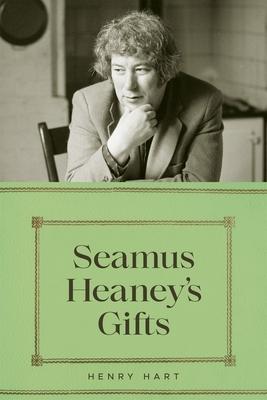"The fact of the matter," Seamus Heaney said in a 1997 interview with the Paris Review, "is that the most unexpected and miraculous thing in my life was the arrival in it of poetry." Throughout his career, Heaney, who received the 1995 Nobel Prize in Literature, maintained that poetry came to him from a mysterious source like a gift of grace. He also believed that the recipient of this sort of boon had an ethical obligation to share it with others.
Seamus Heaney's Gifts, by the noted scholar and poet Henry Hart, offers the first comprehensive examination of Heaney's preoccupation with gifts and gift-exchange. Drawing on extensive research in Heaney's papers, as well as three decades of correspondence with the poet, Hart presents a richly detailed study of Heaney's life and work that foregrounds the Irishman's commitment to the vocation of poetry as a public art to be shared with audiences and readers around the world. Heaney traced his devotion to gifts back to the actual present of a Conway Stewart fountain pen that his parents gave him at the age of twelve when he left his family farm in Northern Ireland to attend a private Catholic secondary school in Londonderry. He commemorated this gift in "Digging," the first poem in his first book, and in two poems he wrote near the end of his life: "The Conway Stewart" and "On the Gift of a Fountain Pen." Friends and doctors had warned him that his endless globetrotting to give lectures and poetry readings had damaged his health. Yet he felt obligated to share his talent with audiences around the world until his death in 2013. As Hart shows, Heaney found his first models for gift-giving in his rural community in Northern Ireland, the Bible, the rituals of the Catholic Church, and the literature of mystical and mythical quests. Blending careful research with evocative commentaries on the poet's work, Seamus Heaney's Gifts explains his ideas about the artist's gift, the necessity of gift-exchange acts, and the moral responsibility to share one's talents for the benefit of others.
"The fact of the matter," Seamus Heaney said in a 1997 interview with the Paris Review, "is that the most unexpected and miraculous thing in my life was the arrival in it of poetry." Throughout his career, Heaney, who received the 1995 Nobel Prize in Literature, maintained that poetry came to him from a mysterious source like a gift of grace. He also believed that the recipient of this sort of boon had an ethical obligation to share it with others.
Seamus Heaney's Gifts, by the noted scholar and poet Henry Hart, offers the first comprehensive examination of Heaney's preoccupation with gifts and gift-exchange. Drawing on extensive research in Heaney's papers, as well as three decades of correspondence with the poet, Hart presents a richly detailed study of Heaney's life and work that foregrounds the Irishman's commitment to the vocation of poetry as a public art to be shared with audiences and readers around the world. Heaney traced his devotion to gifts back to the actual present of a Conway Stewart fountain pen that his parents gave him at the age of twelve when he left his family farm in Northern Ireland to attend a private Catholic secondary school in Londonderry. He commemorated this gift in "Digging," the first poem in his first book, and in two poems he wrote near the end of his life: "The Conway Stewart" and "On the Gift of a Fountain Pen." Friends and doctors had warned him that his endless globetrotting to give lectures and poetry readings had damaged his health. Yet he felt obligated to share his talent with audiences around the world until his death in 2013. As Hart shows, Heaney found his first models for gift-giving in his rural community in Northern Ireland, the Bible, the rituals of the Catholic Church, and the literature of mystical and mythical quests. Blending careful research with evocative commentaries on the poet's work, Seamus Heaney's Gifts explains his ideas about the artist's gift, the necessity of gift-exchange acts, and the moral responsibility to share one's talents for the benefit of others.Hardcover
$39.95